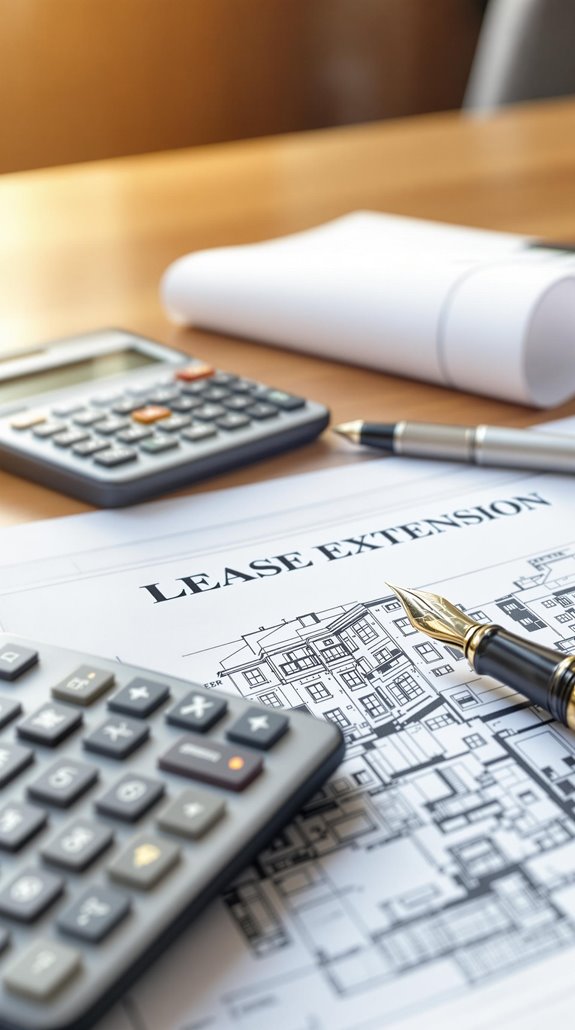I’ve seen too many leaseholders pay thousands more than necessary for their lease extensions simply because they didn’t understand the true cost structure. The difference between a fair premium and an inflated one can easily reach five figures, especially when you’re dealing with marriage value calculations and professional fees. Before you even consider making an offer to your freeholder, you’ll need to understand exactly what drives these costs and where the potential pitfalls lie.
Key Takeaways
- Premium costs range from 0.1-0.3% of property value above 80 years, but increase dramatically by 20-40% below this threshold.
- Budget £3,000-£5,000 for professional fees including your solicitor (£600-£1,200), surveyor (£600-£900), plus the freeholder’s costs.
- Start negotiations 18-24 months before lease expiration to secure better terms and avoid rushed, expensive decisions.
- Leases under 70 years severely impact property value and mortgage availability, potentially reducing sale prices by 15-30%.
- Additional costs include £65 Land Registry fees and Stamp Duty Land Tax if the premium exceeds £125,000.
Primary Components That Make Up Lease Extension Costs

When planning a lease extension, you’ll encounter several distinct cost components that collectively determine your total expenditure. The premium payable to your freeholder represents the largest expense, calculated using statutory formulas that consider your property’s value and remaining lease term. You’ll also need specialist legal representation, with solicitor fees typically ranging £600-£1,200 for handling negotiations and documentation, including solicitor’s basic charges. Professional valuation fees are essential, as you’ll need a surveyor to assess your property and calculate a fair premium. Additionally, you’re legally required to cover your freeholder’s reasonable costs for their legal and valuation expenses.
Finally, government fees including potential Stamp Duty Land Tax and Land Registry charges complete the picture. Understanding these components helps you budget effectively and avoid unexpected costs during the extension process. The entire process typically takes 3 to 12 months, so proper financial planning and early preparation are crucial for managing these various cost elements.
Key Factors That Influence Your Premium Costs
Although you’ve identified the main cost components, several important factors determine exactly how much premium you’ll pay to your freeholder.
Your property’s current market value serves as the foundation for all calculations – higher values mean higher premiums. The remaining lease term greatly impacts costs, with leases under 80 years triggering marriage value payments that can double your bill.
Your ground rent level directly affects the premium since you’re compensating the freeholder for lost income. Escalating ground rents create higher premiums than fixed amounts.
The relativity rate – your property’s value percentage compared to similar freehold properties – varies considerably based on local market evidence and comparable sales data. Professional valuation advice is recommended to navigate these complex calculations and ensure accurate assessment. Additionally, understanding the hidden costs associated with leasehold ownership can help you better prepare for the financial responsibilities involved.
These interconnected factors create your unique premium calculation, making early action essential for controlling costs.
Professional Service Fees You’ll Need to Budget For
Beyond the premium payment itself, you’ll face substantial professional service fees that can add £2,000 to £4,000 to your total lease extension costs.
You’ll need your own valuation surveyor at £600-£900 to assess your property’s lease extension value. Your solicitor will handle the legal work for £800-£1,300, though some charge £600-£1,200 depending on complexity. It’s wise to compare solicitors to ensure you’re getting the best deal possible.
Here’s what stings: you’re also responsible for the freeholder’s costs. Their valuation surveyor runs £600-£900, and their solicitor charges £800-£1,300. These aren’t optional—they’re mandatory reimbursements.
Add £65 for Land Registry fees to register your new lease. If you’re facing a premium over £125,000, factor in Stamp Duty Land Tax too. The conveyancing process typically takes 2-3 months once terms are agreed, though complex cases can extend longer.
Smart leaseholders budget the full professional fee range upfront to avoid nasty surprises.
Critical Lease Term Thresholds That Impact Your Costs
Your lease length dictates whether you’ll pay a reasonable premium or face a financial nightmare. The 80-year threshold is your red line—cross below it, and you’ll trigger marriage value, an additional premium reflecting 50% of your property’s value gain post-extension. This typically adds 20-40% to your costs.
Above 80 years, you’ll pay just 0.1-0.3% of your property’s value. Below 80 years, costs escalate dramatically—think £50k-£70k for an £800k London flat versus £20k-£35k above the threshold.
The 70-year mark creates another crisis point. Most lenders won’t finance properties below this threshold, forcing cash-only sales that depress prices by 15-30%. Previously, buyers faced a frustrating two-year wait before they could address these urgent lease issues, but this ownership requirement has been abolished from January 31st, 2025. Don’t let your lease deteriorate past these critical points—extension costs compound annually.
Average Cost Benchmarks Across the UK Market
Understanding the market’s baseline costs helps you budget realistically for your lease extension. I’ve analyzed nationwide data showing the total average cost sits at £7,022, including all premiums, professional fees, and freeholder charges you’ll encounter.
The lease premium represents your largest expense, typically starting at £5,000 but ranging between £6,000–£8,000 for properties valued £80,000–£350,000. Professional fees add another £2,500–£4,000 covering both parties’ surveyors (£600–£900 each) and solicitors (£800–£1,300 each).
Here’s what catches many leaseholders off-guard: freeholders’ “reasonable costs” often exceed your equivalent expenses by 10–20% since they’re less cost-conscious with your money. Additionally, understanding hidden fees can help you avoid unexpected costs during the lease extension process. Land Registry fees remain minimal at £65, but don’t let that fool you—the other components will stretch your budget considerably.
Remember that marriage value applies to leases with 80 years or less remaining, which can substantially increase your total costs beyond these baseline figures. Getting professional advice from local property experts ensures you understand all financial implications before committing to the extension process.
Cost-Saving Strategies to Avoid Overpaying
While most leaseholders resign themselves to high extension costs, smart strategic planning can slash your expenses by thousands. I recommend extending before your lease drops below 80 years to avoid marriage value premiums that can add 40% to your bill. If you’re above 80 years, wait until post-2026 reforms deliver 990-year extensions at peppercorn rent, which will significantly enhance property value for flat owners.
Start with informal negotiations before statutory claims to reduce legal costs. Use independent surveyor reports to counter inflated freeholder quotes, and request their valuation calculations for transparency. I’d dispute unreasonable legal cost claims through First-Tier Tribunal rather than accepting them.
Hire specialist solicitors with lease extension expertise and RICS-regulated surveyors. Compare fixed-price services and bundle multiple property services for fee discounts. Remember that you’ll be responsible for the freeholder’s costs during the extension process, so factor these additional expenses into your budget planning.
Understanding Marriage Value and the 80-Year Rule

Once your lease drops below 80 years, you’ll face marriage value—a legal mechanism that can double your extension costs overnight. I’ve seen countless leaseholders caught off-guard by this brutal reality.
Marriage value represents the theoretical profit generated when you extend your lease. It’s calculated as your property’s post-extension value minus its pre-extension value. Under the Leasehold Reform Act 1993, freeholders automatically claim 50% of this marriage value when your lease falls below 80 years.
The numbers are stark: extending at 81 years might cost £10,000-12,000, but wait until 79 years and you’re looking at £18,000-22,000. That’s because marriage value becomes the largest cost component, especially for shorter leases under 70 years. If disputes arise over valuation or terms, cases may require tribunal resolution through the First-tier Tribunal.
Here’s the key: leases above 80 years avoid marriage value entirely.
Hidden Costs and Additional Expenses to Consider
Beyond the statutory premium, lease extensions trigger a cascade of professional fees that can add £3,000-£5,000 to your total costs. You’ll pay for both your surveyor (£600-£900) and your solicitor (£600-£1,200), but here’s what catches people off-guard: you’re also covering the freeholder’s professional fees. That’s another £800-£1,300 for their legal costs plus £600-£900 for their surveyor. Additionally, it’s crucial to be aware of any restrictive covenants that may affect your property, as these can impose significant limitations on your usage and potential alterations.
Don’t forget the mandatory £65 Land Registry fee and potential stamp duty if your premium exceeds £125,000. If negotiations drag beyond six months, you’ll face re-valuation fees. Listed buildings or unusual properties attract specialist valuations costing 15-20% more.
I’ve seen leaseholders blindsided by these “reasonable costs” claims from freeholders covering administrative charges and document processing fees. When disputes arise, cases may proceed to the Leasehold Valuation Tribunal, which can be both time-consuming and expensive despite providing fair review.
When to Act: Timing Your Lease Extension for Maximum Savings
Understanding these costs matters little if you time your lease extension poorly. I’ll show you exactly when to act for maximum savings.
Start your negotiations 18-24 months before expiration. This gives you leverage to secure rent freezes and avoid rushed decisions that cost money. You’ll demonstrate long-term commitment while having time for proper valuations. Additionally, securing a lease extension can prevent you from incurring significant valuation charges associated with the conversion process.
Never let your lease drop below 80 years. Once it hits this threshold, you’ll face “marriage value” premiums adding 10-50% to your costs. Properties under 80 years also struggle with mortgages and marketability.
Time your extension during market downturns when property values are lower. Schedule premium payments during your high-cashflow periods to avoid financing fees. Allow 3-6 months for legal processes—rushing weakens your negotiation position and costs you money. Written agreements provide essential legal protection throughout the extension process and help prevent costly disputes.
Conclusion
Don’t let lease extension costs catch you off guard. I’ve shown you the key factors that drive premiums, from marriage value to professional fees. You’ll save thousands by acting before the 80-year threshold and negotiating strategically. Get multiple valuations, challenge inflated premiums, and budget for hidden costs. Time’s your biggest ally here – start early, engage experienced professionals, and you’ll secure a fair deal without overpaying.
References
- https://hoa.org.uk/advice/guides-for-homeowners/for-owners/lease-extension-costs/
- https://www.apassociates.org/how-much-does-it-cost-to-extend-a-lease-unveiling-the-factors-and-process/
- https://www.comparemymove.com/guides/conveyancing/extending-a-lease-cost
- https://www.independent.co.uk/money/spend-save/leasehold-homeowners-overpaying-extend-leases-fees-sales-housing-market-a7848556.html
- https://www.checkatrade.com/blog/cost-guides/lease-extension-cost/
- https://www.moneysupermarket.com/mortgages/leasehold-extension/
- https://shortleasepropertysales.co.uk/lease-extension-costs-the-ultimate-number-crunching-guide
- https://www.homewardlegal.co.uk/guides-advice/post/how-much-does-it-cost-extend-lease
- https://www.scrivenertibbatts.co.uk/12-commonly-asked-questions-and-answers-about-residential-lease-extensions-in-england-and-wales/
- https://homehold.org/standard-article/how-is-my-lease-extension-premium-calculated/

